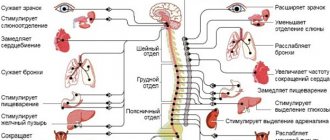Alcoholic dementia is brain damage that occurs as a result of long-term drinking of large amounts of alcohol. Clinically, this form of dementia is no different from others. Ethyl alcohol disrupts the functions of neurotransmitters that are responsible for human emotions and behavior. Long-term use of alcohol forms stable addiction and mental disorders. According to statistics, alcoholic dementia is most often diagnosed in men over 55 years of age. In the international classification of diseases ICD-10, alcoholic dementia is coded F10.6.
Doctors at the Yusupov Hospital diagnose and treat alcoholic dementia. Modern medical equipment that meets safety and quality requirements is used for the examination. Therapy is prescribed taking into account the individual characteristics of patients. Drugs are selected in accordance with European recommendations for the treatment of alcoholic dementia.
Causes of alcoholic dementia
Neuronal damage occurs due to prolonged exposure to aceldehyde. This is a substance formed during the breakdown of ethanol. Aceldehyde causes destruction of the vascular wall and provokes the formation of atherosclerosis. Chronic alcohol intoxication causes changes in brain structures, disruption of blood microcirculation and damage to the central nervous system. Men over 55 years of age are susceptible to dementia due to alcoholism. However, doctors do not rule out an earlier onset of the disease. Alcohol intoxication provokes the formation of the following causes leading to dementia:
- cerebrovascular accident;
- chronic cerebral ischemia;
- arterial hypertension;
- stenosis;
- atherosclerosis;
- Alzheimer's disease;
- Parkinson's disease;
- metabolic pathology.
The risk of developing alcoholic dementia increases with the presence of tumors, a history of head trauma, and a hereditary predisposition. Elimination of the etiological factor is necessary for complex treatment. If therapy is not started in time, alcoholic dementia can cause early disability.
Complications arising during treatment
After starting therapy, side effects occur that can lead the alcoholic to refuse therapy:
- withdrawal syndrome (the body’s reaction to the cessation of the effects of alcohol, which is manifested by severe pain and aches throughout the body);
- hangover seizures (a patient’s condition in which he loses consciousness, rolls his eyes, and body temperature rises);
- alcoholic delirium (manifestation of hallucinations, delirium, clouding of consciousness, deterioration of the patient’s mental and neurological condition, convulsions).
Important! In order for the patient not to stop treatment for alcoholic dementia, the doctor must eliminate the consequences of treatment: headache, drug intoxication, seizures, intestinal dysfunction.
Drugs are used that relieve neurological side effects (Lorazepam, Elenium). They prevent seizures and reduce the effects of withdrawal symptoms. They are used for a long time. The dose is selected so that the person is slightly drowsy.
Types of alcoholic dementia
Depending on the location of the lesion, the following types of alcoholic dementia are distinguished:
- Subcortical. Characterized by a narrowing of consciousness, fixation on imaginary problems. Patients are only concerned about themselves. Subcortical alcoholic dementia develops gradually. In the early stages, symptoms of depression and emotional lability appear. At the same time, memory is not impaired for a long time.
- Cortical. Accompanied by a more pronounced clinical picture and rapid progression. At the beginning of the disease, absent-mindedness and forgetfulness appear. As alcoholic dementia progresses, disorientation in time and space appears. Late stages are characterized by hallucinations.
- Multifocal. The clinical picture combines signs of subcortical and cortical lesions. The result is multifocal dementia. The patient's behavior becomes unpredictable, and complete personality degradation is observed. In the later stages of the disease, constant outside care is required.
The rate of progression of alcoholic dementia depends on the location of the pathological process. The destruction of neurons can quickly move to another zone with the formation of a multifocal lesion. If, against the background of alcohol dependence, there is an addiction to drugs, then the rate of progression of alcoholic dementia increases several times.
Expert opinion
Author: Vladimir Vladimirovich Zakharov
Neurologist, Doctor of Medical Sciences, Professor, Head of the Center for Diagnostics and Treatment of Memory Disorders
Alcoholic dementia is a gradual shutdown of brain function due to chronic intoxication with alcohol and metabolic products. Like any other type of dementia, it cannot be cured, but there is a chance to slow down its progression. And the sooner the patient turns to specialists, the better.
Dementia is characteristic of older age, but now we are faced with early manifestations of dementia. And one of the most significant reasons is alcohol. Unfortunately, in Russia there are no statistics on alcoholic dementia, because few people deal with such a problem. If you believe WHO data, then most often residents of the countries of the former USSR and some Asian countries, as well as Finland, suffer from dementia due to alcohol consumption.
The manifestations of all types of dementia are similar: personality degradation, memory loss, emotional lability, inability to care for oneself, and hallucinations. If the cause is alcohol, then patients are more aggressive. There is no need to think that dementia occurs with the last stage of alcoholism. With the constant use of “strong” drinks, many symptoms of the disease appear.
Damage to nervous tissue is irreversible, but modern drugs can slow down the degradation. Of course, you can’t do this with medications alone, and you need an integrated approach.
Why drinkers are prone to developing mental retardation
Ethanol is a toxic substance that disrupts the structure of brain neurons. The cells of the central nervous system are destroyed over time from constant exposure to alcohol and its breakdown products. This process is gradual and irreversible; a person himself often does not notice changes in his behavior and perception of the world. The first to pay attention to such changes are the patient’s relatives, who begin to sound the alarm. Mental disability manifests itself especially clearly at stages II and III of alcoholism.
Stages of alcoholic dementia
Alcohol-induced dementia occurs in several stages. Among them are:
- Elementary. Clinical symptoms of damage to the central nervous system are not expressed. Depression gradually develops, detachment from other people, and withdrawal into oneself arise.
- Mild dementia. The toxic effects of aceldehyde lead to impaired memory and attention. As the lesion progresses, disorientation develops.
- Moderate dementia. Characterized by impaired mental activity and speech. At this stage, patients completely withdraw into themselves.
- Severe dementia. Total personality collapse. Patients do not recognize loved ones and do not orient themselves in time and space. The ability to self-service is completely lost.
Characteristics of the concept
A person who drinks regularly independently triggers the mechanism of destruction of neurotransmitters that affect behavior and emotions. Systematic drinking of alcohol leads to physical and psychological dependence, as a result of which alcoholic dementia develops. This disease can block all skills acquired in the process of life, causing serious intellectual disorders.
Note! Alcoholic dementia is most often diagnosed in the post-Soviet space, in Finland and in Asian countries.
Memory is impaired, the patient may not recognize his relatives, does not know their names. Brain functions decline, which leads to loss of speech skills: the patient is only able to moo. Serious problems with sleep are recorded, the rest and wakefulness patterns are disrupted.
The disease leads not only to intellectual degradation, but also to a decrease in personal characteristics and mental disorders. An alcohol addict becomes irritable, confrontational, and often causes scandals.
Clinical picture of alcoholic dementia
Alcohol-induced dementia is characterized by gradual damage to neurons. The toxic effect of aceldehyde in the initial stages of the disease may be invisible to the patient himself, as well as to others. As the condition worsens, the following clinical symptoms appear:
- Memory impairment. Long-term memory is affected initially. The patient does not remember events or dates. Subsequently, short-term memory is impaired.
- Emotional lability. Alcohol addicts are characterized by emotional instability. In connection with the development of alcoholic dementia, aggression and infantilism appear. Patients can talk to themselves. Retardation appears. Actions become thoughtless.
- Depression. Often mistaken for chronic fatigue.
- Disorientation in time and space. Characteristic of late stages of alcoholic dementia. Patients do not understand where they are and cannot determine the time of day.
- Periods of enlightenment. Characteristic of the early stages of the disease. Another reason for enlightenment is the treatment performed.
- Dropping out of social life. As a result of alcoholic dementia, the patient becomes isolated on himself. The lives of those around him cease to concern him.
- Loss of professional skills. As nerve cell damage progresses, patients become unable to even perform self-care.
- Disturbance of the sleep-wake period. Bedtime may shift to morning or afternoon hours. Patients can sleep for several hours, while staying awake for several days in a row.
- Damage to the central nervous system. In this case, hand tremors, decreased muscle tone, slow reaction of the pupils to light, unsteady gait, and speech impairment appear. Such symptoms are considered a sign of irreversibility of the condition. The symptoms cannot be treated.
Development mechanism
Ethanol in the patient's body destroys neurotransmitters, which are designed to coordinate a person's emotional perception of the environment and his behavior in response to it. As long as the connection between emotions and behavior remains, a person is adequate, he reacts to all events around him and can make one or another decision appropriate to the situation. Alcohol actively interferes with a person’s mental activity, first causing encephalopathy, and then persistent mental disorders. Dementia is the beginning of the destruction of a person's intellect.
Acetaldehyde, one of the metabolites of ethanol, is considered the active toxic substance. It paralyzes blood vessels, takes them completely under its control, and changes the properties of the vascular wall. It loses its elasticity, active thrombus formation and the formation of atherosclerotic plaques begin in the vessels. At the same time, the functioning of all organs and systems is disrupted: the kidneys, liver, heart, digestive system and brain are affected. Ethyl alcohol inhibits the activity of its neurons, toxically destroys the cortex, resulting in dementia.
Particularly severe disturbances are caused by the use of surrogates, which are used by an alcoholic already in the later stages of alcohol dependence. In this case, dementia becomes a harbinger of death. A hereditary predisposition to alcoholism can aggravate the situation. Those around them begin to acknowledge the fact that the patient has lost the ability to perceive reality, reason, remember, and speak clearly. It is impossible to restore lost functions, you can only stop the development of dementia.
Diagnosis of alcoholic dementia
Diagnosis of alcoholic dementia requires a comprehensive approach. This form of dementia can be detected using an MRI or CT scan. Tomography allows you to establish the localization of the pathological process. Alcoholic dementia requires differential diagnosis with other brain lesions. The early stage of dementia is often mistaken for mental disorders, symptoms of tumor formation or intracranial hematomas.
The Yusupov Hospital uses modern medical equipment to detect the disease. Thanks to this, it is possible to detect neuronal damage even in the early stages. This allows for timely treatment and relieves the patient of pathological symptoms.
Clinic
Alcohol-induced dementia has its own symptoms. The diagnosis of alcoholic dementia is made on the basis of the clinic and is confirmed by the results of an instrumental examination. Manifestations of the disease are staged:
- The first (early) stage of mental disorders causes little discomfort to the patient and his relatives. They are perceived by others as the famous “midlife crisis” or chronic fatigue syndrome. But the appearance of peculiar childish traits, the inability and unwillingness to make decisions and be responsible for them should alert those who are nearby. Not noticing such changes means missing the golden time to start therapy.
- The stage of moderate symptoms (the second stage) is manifested by emotional lability, loss of communication with others, loss of orientation, and memory loss. Sometimes, already at this stage, patients need outside help to take care of themselves in everyday life.
- The third stage (severe) is manifested by a complete loss of will, denial of the existence of loved ones, passive dependence on anyone.
Treatment of alcoholic dementia
Alcohol-induced dementia is an irreversible condition. The main goals of therapy are to slow the progression of the disease and relieve symptoms. Treatment is selected depending on the stage of the disease.
- Easy. The initial stages of alcoholic dementia are treated with antidepressants and vitamin preparations. In addition, neurologists prescribe medications that normalize cerebral circulation and improve vascular function.
- Moderate. More severe clinical symptoms require extended therapy. For this purpose, drugs that relieve psychopathic symptoms are added to treatment.
- Heavy. Requires constant outside care. To alleviate the condition, sedatives and antipsychotic drugs are prescribed.
Treatment of alcoholic dementia is impossible without complete cessation of alcohol consumption. Drug therapy is complemented by dietary nutrition, psychotherapy, and physiotherapy. Doctors at the Yusupov Hospital pay special attention to concomitant diseases. Without stabilizing blood pressure readings and normalizing blood glucose levels, therapy will be considered ineffective. Due to the specifics of the condition, it is recommended that the first months of treatment be carried out in a hospital setting. At the Yusupov Hospital, an individual treatment plan is developed for each patient. Therapy is selected taking into account the stage of alcoholic dementia, the presence of concomitant diseases and the patient’s age. The drugs used are included in the list of European standards for the treatment of dementia due to alcoholism. All patients undergo consultation with a psychotherapist. This allows us to identify the causes of pathological addiction to alcohol. The method is most effective at the early stage of the disease.
Further more
Over time, a person suffering from alcoholic dementia changes in personality
. Man becomes more primitive and brutal (in the sense that the ancient Romans gave to the word brutalis - that is, “bestial”), and moral and ethical principles either die out or are successfully hidden. The humor becomes flat and uncomplicated. There appears a tendency to teach, reproach, and lecture, combined with a complete rejection of criticism towards oneself. Attractions are released from the brakes: a person reveals an amazing gluttony, is actively interested in the opposite sex, even if only his blood pressure can rise, and only his hemorrhoids can become elastic. There is often a passion for collecting all sorts of rubbish, when the apartment turns into a branch of a solid waste landfill.
Forecast and prevention of alcoholic dementia
Most often, brain damage caused by alcoholism is an irreversible condition. A favorable prognosis is only possible if dementia is diagnosed in the early stages. Slow progression of the pathological condition leads to late seeking medical help. As neuronal damage progresses, the prognosis becomes poor. Severe stages of the disease require constant outside care and lead to disability.
Unlike other forms of dementia, alcoholic dementia is preventable. To do this, you must follow the following medical recommendations:
- lead a healthy lifestyle;
- adhere to the principles of rational and balanced nutrition;
- drink alcohol in moderation or completely abstain from it;
- timely treatment of somatic diseases.
Self-medication for alcoholic dementia is not possible. When the first signs of the disease appear, you should consult a doctor.
You can get diagnosed and treated for alcoholic dementia at the Yusupov Hospital. Experienced neurologists individually select therapy that meets international standards for the treatment of alcoholic dementia. You can make an appointment by phone.
Forecast
If treatment began at an early stage, the prognosis is favorable, subject to absolute abstinence from alcohol and other addictions. If the patient develops obvious clinical symptoms of brain dysfunction, the consequences are not reversible. In this case, with the help of drug therapy, the process of destruction of neurons and cells of other organs is stopped.
When failure or death of internal organs occurs, the prognosis is unfavorable. The patient will require constant care.
If the function of the respiratory center of the brain is impaired, artificial ventilation is installed. On this device, vital functions are supported for a certain amount of time. Without treatment, such patients will die.
Stages of the disease
The rate of development of alcoholic dementia depends on many factors: the amount of alcohol consumed, concomitant diseases, genetic inheritance, drug use. This means that dementia can develop differently in different patients, but still, as a rule, the disease goes through four main stages:
- Stage one: initial. The only external sign is emotional disorders - the appearance of isolation, the predominance of depressive moods, the loss of previous interests and hobbies.
- Stage two: easy. Mild dysfunctions of memory, attention and logical thinking are observed: patients find it difficult to remember or concentrate, and any intellectual stress comes at the cost of noticeable effort.
- Stage three: middle. Symptomatically repeats the second stage, but the disturbances are much more pronounced: patients clearly do not control their attention, cannot remember anything, have difficulty remembering past events, and intellectually demonstrate violations of logical coherence, consistency of judgments or inferences.
- Stage four: severe. There is a complete disintegration of the personality with disruption of all mental functions, loss of moral principles and the development of various mental disorders.











